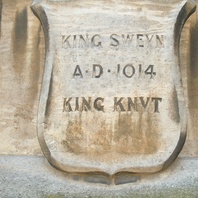
Viking Names
Svein
The Old Norse male name Sveinn was one of the commonest in Scandinavia, particularly in Denmark and Sweden, where it is recorded in many runic inscriptions. It occurs as the first element in the Lincolnshire place-name of Swinethorpe. Early forms of this name confirm that it is nothing to do with swine, but rather contains this name. The name continued in use in both Lincolnshire and Yorkshire well into the thirteenth century. It was famously the name of the father of King Knútr, later king of all England. Sveinn was known as ‘Forkbeard’ and died in Gainsborough, Lincolnshire, in 1014 according to the Anglo-Saxon Chronicle.
Read More
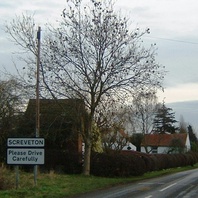
Viking Names
Screveton
Screveton, in the Bingham Wapentake of Nottinghamshire, is made up of two Old English elements, scir-gerefa ‘sheriff’ and tun ‘farm, settlement’. However, the modern pronunciation (as if ‘sk-‘) is due to the influence of Scandinavian-speakers. Old English words beginning in sc- (usually sh- in Modern English, like ‘ship’) often have Scandinavian equivalents spelled (and pronounced) sk- (like Old Norse skip and Modern Danish skib for the same thing). Many modern English words beginning in sk- derive from Old Norse.
Read More
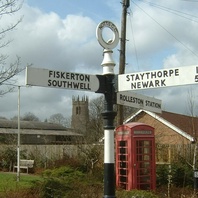
Viking Names
Fiskerton
Fiskerton, in the Thurgarton Wapentake of Nottinghamshire, is from the Old English elements fiscere ‘fisher’ and tun ‘farm, settlement’. The pronunciation has however been influenced by Scandinavian-speakers (compare Old Norse fiskari with the same meaning). There is also a Fiskerton in Lincolnshire, which has undergone the same process.
Read More
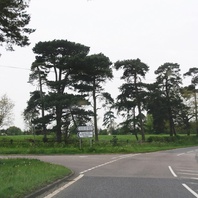
Viking Names
Toynton All Saints
Toynton All Saints, in the Bolingbroke Wapentake of Lincolnshire, is probably ‘the farmstead, village associated with or called after Tota’, from the Old English male personal name Tota with the Old English medial connective particle -ing and Old English element tun ‘farm, settlement’. Alternatively, the first element could be Old English tot ‘a look-out’. Thus, ‘farm/settlement at *Toting (= the look-out place)’. The affix is from the dedication of the church.
Read More

Viking Names
Riby
Riby, in the Yarborough Wapentake of Lincolnshire, was originally an Old English compound Rygetun ‘the farmstead or village where rye grows’. The Old English tun ‘farm, settlement’ was replaced by Old Norse by ‘farm, settlement’.
Read More
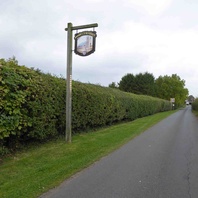
Viking Names
Fenby
Fenby, in the Haverstoe Wapentake of Lincolnshire, is an Anglo-Scandinavian hybrid from Old English fenn ‘a fen, a marsh, marshland’ and Old Norse by ‘a farmstead, a village’. It is most likely to be a partial Scandinavianization of an earlier Old English place-name, perhaps Fenton, with a similar meaning. Fenby is now a joint parish with Ashby, and the name survives in Fenby Farm, which lies in what must have been a fenny area on the lower slope of the Wolds.
Read More

Viking Names
Kirton
Kirton, in the Bassetlaw Wapentake of Nottinghamshire, is a hybrid name, a compound of Old Norse kirkja ‘a church’ and Old English tun ‘ an enclosure; a farmstead; a village; an estate’.
Read More
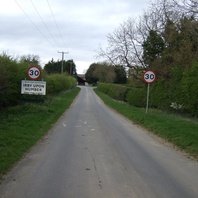
Viking Names
Irby upon Humber
Irby upon Humber, in the Bradley Wapentake of Lincolnshire, comes from Old Norse Íra,the genitive plural form of Íri ‘an Irishman; probably also a Norseman who had lived in Ireland’ and Old Norse by ‘a farmstead, a village’. The reference is probably to an isolated settlement of Norwegian vikings from Ireland, or perhaps Irishmen who came with the vikings to England. However, the exact implications of such a name are not yet fully understood and are the subject of ongoing work by Dr Jayne Carroll of the Institute for Name-Studies, University of Nottingham. Irby upon Humber is to distinguish the place from Irby in the Marsh, also in Lincolnshire.
Read More
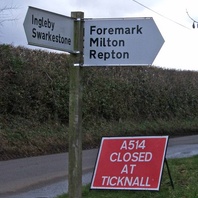
Viking Names
Repton
Repton, in the Repton and Gresley Hundred of Derbyshire, comes from Old English Hrype, an Anglian tribe, and Old English dun ‘a hill’. According to the Anglo-Saxon Chronicle, The Great Heathen Army wintered in Repton in 873-4.
Read More
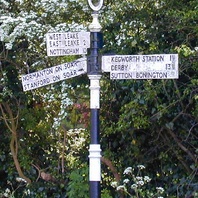
Viking Names
West Leake
West Leake, in Rushcliffe Wapentake of Nottinghamshire, is a simplex name from Old Norse lœkr ‘brook’. East and West Leake are on the banks of a small stream which joins the Soar at Kingston.
Read More
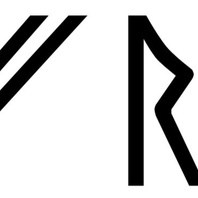
Viking Names
Ingifrid
Ingifríðr appears fairly frequently in Denmark and Sweden. The name is attested twice in England during the Middle Ages in the forms Ingefrit and Ingefrid in documents from Lincolnshire and Yorkshire respectively. It is an Old Norse compound name with its first element Ingi-, which is of doubtful origin but might relate to a Greek word meaning ‘lance’ or ‘staff’ combined with and the second element -fríðr, related to Gothic frījōn ‘to love’, with original meaning ‘loved’, later ‘fair’. In origin it is thus the same name as Ingiríðr.
